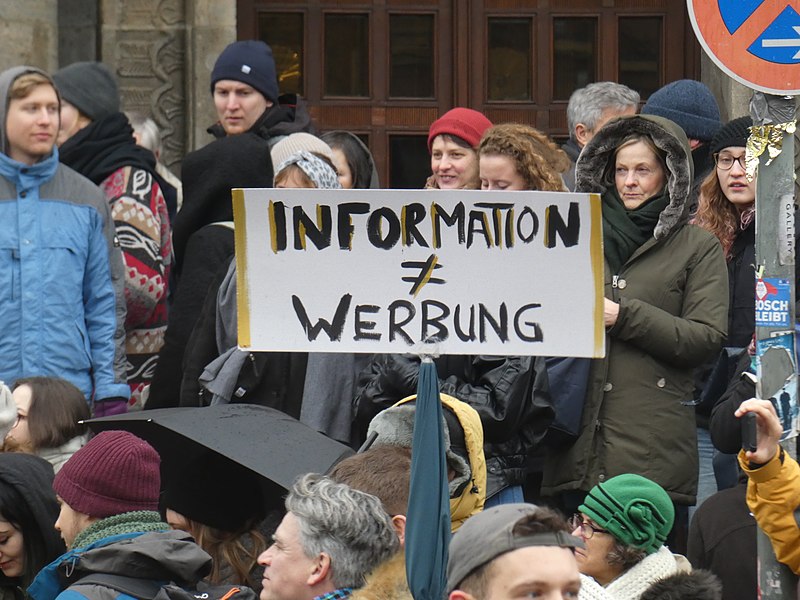When it comes to Europe´s most restrictive abortion laws, Andorra, Poland, and Malta are among the countries that tend to make headlines. Yet even in a country like Germany, which is widely perceived as a liberal country, reproductive laws are surprisingly restrictive. German law permits abortions during the first trimester but uses various measures including paragraph 219a, which came into force in 1933, to in effect discourage women from undergoing them. Since 2019, medical practices have been allowed to inform patients that they perform abortions, but further information regarding the procedure is still prohibited.
What is the Law Around Abortions in Germany? – Germany´s Criminal Code
In the German Criminal Code (das Strafgesetzbuch, StGB), paragraphs 218 and 219 can be found between the laws based on murder and abandonment. They showcase the criminalization surrounding abortions in Germany. According to the German law laid out in paragraph 218, anyone who terminates a pregnancy can be fined or imprisoned for up to three years.
There is no criminal liability if the abortion is done with the goal of protecting the health of the woman, pregnancy caused by rape, or if the woman takes part in a consultation and undergoes the abortion before the 12th week of pregnancy. However, these exceptions do not make abortion legal, but rather allow this procedure to be done without punishment.
Apart from this restriction, abortion access is further limited by a Nazi-era legislation. Section 219a of the German Criminal Code regulates the so-called “ban on advertising” for abortions. Until recently, doctors were not allowed to state publicly that they perform abortions. A debate on this was triggered by a court ruling: The conviction of General Practitioner Kristina Hänel, which took place in 2017, led to a reform of the law two years after.
Since 2019, it has been possible for doctors to publicise the fact that they perform abortions, as long as they provide no further details and redirect the women to counseling centers such as Profamilia.
Therefore, many doctors refrain from it completely, as they do not want to enter a legal grey area. This interference makes it difficult for women to obtain factual and legitimate information such as the risks and potential complications from experts, which is essential in making a self-determined and informed decision.
Information is not a Crime – Departure from Conservative Policies
German abortion law as part of the Criminal Code results in several challenges for women. Firstly, women are not in charge of their physical integrity and face mandatory intervention from a paternalistic state.
Furthermore, the lack of impartial information and geographically limited access to abortion prevents women from making well-informed decisions and shows that legislators are prejudiced against women who choose to end their pregnancies. It ignores the needs of affected women and the fact that there is an information and care gap – especially surrounding the women living in rural areas. Women report that access to abortion remains limited within their geographical region, forcing some of them to travel more than 150 km to “find a doctor who is willing or able to offer an abortion”[1]. In 2018, more than 1000[2] crossed into the Netherlands, where the process is simpler, and the time limit for undergoing a termination is 22 weeks.
Now with a new socially liberal coalition, the new federal justice minister, Marco Buschmann (FDP), announced a bill for January to abolish the ban on advertising abortions. Buschmann said the so-called paragraph 219a constitutes a “penal risk” for doctors performing legal abortions who give factual information on the internet, and that is “absurd.”
“Many women who wrestle with themselves on the question of an abortion look for advice on the internet,”[3] he said. “It cannot be that, of all people, the doctors who are professionally best qualified to inform them aren’t allowed to provide information there.” The aim is to strengthen women´s right to self-determination. It is time to disseminate the much-needed medical accuracy and neutral information and resources. The abolition of the ban means that pressure can be lifted from affected women and doctors and that the right to information is granted. Abortions must be seen as part of healthcare for women and not something that is outside of that framework.
[1] Bruhn, Eiken: Die ungewollte Patientin, auf: taz.de (6.3.2017)
[2] https://www.weiterdenken.de/de/2020/10/14/zum-recht-auf-abtreibung-den-niederlanden
[3] https://www.rnd.de/politik/abtreibung-ohne-werbeverbot-paragraf-219a-will-marco-buschmann-streichen-MG4LXZKX72EONCLU7AI5CFVEBE.html

